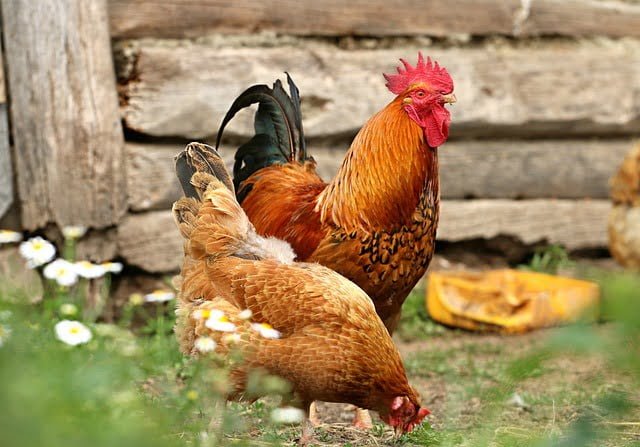Carrots are a staple in the human diet, and many chicken owners wonder if it’s safe to feed them to their flock. In this comprehensive guide, we will explore everything you need to know about feeding carrots to chickens. From the best ways to feed carrots to chickens to the nutritional benefits and potential risks, we’ve got you covered. So, let’s dive in and find out if chickens can eat carrots!
Is it Safe to Feed Carrots to Chickens?
Before we delve into the details of feeding carrots to chickens, let’s address the primary concern: is it safe? The answer is a resounding yes! Chickens can safely consume carrots as a healthy treat in addition to their regular feed. However, moderation is key. Carrots should not replace their primary feed but rather complement it. This ensures that chickens receive a balanced diet and obtain all the necessary nutrients.
Carrots are packed with essential vitamins, including vitamin A and B vitamins, making them a nutritious snack for chickens. They can enjoy carrots in various forms, as long as they are prepared in a way that makes them easier to eat and peck at.

Feeding Raw Carrots to Chickens
Raw carrots can be a bit challenging for chickens to consume due to their hard texture. However, this can be beneficial as it keeps the chickens engaged and prevents boredom. To feed raw carrots to chickens, you have a couple of options. You can either cut the carrots into small bite-sized pieces that chickens can peck from the ground or provide them with larger chunks inside a feeder. Using a treat feeder, such as the Omlet Treat Feeder, can make it easier for chickens to access the carrots.
It’s important to offer carrots in moderation to prevent any potential issues. Feeding chickens excessive amounts of raw carrots can lead to crop impaction. Therefore, it’s advisable to provide them with small portions at a time.
One advantage of feeding raw carrots is that they retain all the nutrients that may be lost through cooking.
Feeding Cooked Carrots to Chickens
If you prefer to feed your chickens cooked carrots, you can do so. Cooked carrots are softer and easier for chickens to consume. However, it’s worth noting that the cooking process may result in a slight reduction in the nutritional value of the carrots compared to their raw form. Despite this, cooked carrots can still be a healthy treat for chickens when offered in moderation alongside their regular feed.
Chickens can consume cooked carrots of any size or shape. Remember to cut them into appropriate pieces to make it easier for the chickens to eat.
Can Chickens Eat Carrot Peel?
Yes, chickens can eat carrot peel. However, it’s essential to ensure that the peels are clean and free from any harmful chemicals, such as pesticides. Carrot peels are thinner and easier for chickens to consume compared to large chunks of raw carrots. They can be provided as an occasional treat in moderation. Avoid placing too many carrot peels at once to prevent them from rotting.
Rules Around Feeding Chickens Scraps
Before feeding your chickens any kitchen scraps or food prepared in a kitchen, it’s crucial to be aware of your local government’s regulations. Some regions have specific rules regarding what can be fed to chickens. For instance, in the UK, it is prohibited to feed chickens any foods prepared in a non-vegan kitchen. These regulations are in place to prevent the potential spread of diseases through cross-contamination.
While these rules may be frustrating for backyard chicken keepers, it’s important to adhere to them to avoid penalties and maintain the health of your flock. However, feeding chickens fresh carrots from the store or garden is generally allowed.
Do Chickens Eat Carrot Tops?
Chickens can indeed eat carrot tops, and they can be a nutritious and safe food for them to enjoy. If you grow carrots in your garden, you can leave the tops for your chickens to scratch and peck through. This not only provides them with a tasty treat but also keeps them entertained and engaged.
Can You Grow Carrots If You Have Chickens?
If you have free-ranging chickens, growing carrots can pose some challenges. Chickens have a natural instinct to scratch and dig in the soil, which can lead to damage to your carrot crop. They can quickly destroy a crop by pecking at the young shoots or unearthing the developing vegetables with their powerful feet.
To protect your carrot crop from the chickens, it’s recommended to fence or net off the area where you grow the carrots. This will prevent the chickens from accessing the carrots and ensure a successful harvest.
How Often Should You Feed Carrots to Chickens?
While carrots can be a healthy treat for chickens, they should not replace their regular feed. Chickens require a balanced diet that includes a complete feed to meet their nutritional needs. Treats, including carrots, should only make up a small percentage of their daily food intake.
Feeding carrots to chickens two to three times per week is generally sufficient. It’s also beneficial to vary the types of vegetables and fruits you offer to provide a wider range of nutrients.
Can Carrots Make Chickens’ Egg Yolks More Orange?
The color of an egg’s yolk has become a measure of its quality for many people. Darker orange yolks are often associated with tastier eggs. Some commercial egg producers add supplements to the chicken’s feed to enhance the color of the yolks. However, if you allow your chickens to free-range, they will naturally produce eggs with darker yolks.
Feeding chickens carrots in an attempt to deepen the color of their yolks is not recommended. Achieving a significant difference would require feeding them a considerable amount of carrots, which could disrupt their overall diet and nutrition. Instead, focus on providing your chickens with a happy and healthy lifestyle, allowing them to forage for bugs and vegetation. This will result in delicious eggs that surpass store-bought ones in taste and quality.

Conclusion
In conclusion, chickens can safely eat carrots as a healthy treat. Whether you choose to feed them raw or cooked carrots, it’s important to offer them in moderation alongside their regular feed. Carrot peels can also be enjoyed by chickens, but make sure they are clean and free from harmful chemicals. If you have free-ranging chickens and want to grow carrots, protect your crop by fencing or netting the area. Remember that treats, including carrots, should only make up a small portion of their diet. And while carrots won’t drastically change the color of their egg yolks, providing a natural and enriching environment for your chickens will result in eggs that are both nutritious and delicious.





